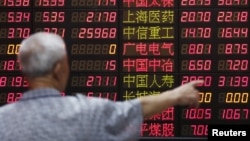China's stock market continued its roller coaster ride Tuesday, with shares first dipping, but rising dramatically in the last few hours of trading on what analysts said was a government driven boost.
The late day trading leap followed on the heels of news the government would soon begin to allow a portion of the country's pension funds to be invested in the market and the top securities regulator called on investors to have faith in the market.
The pension move is the latest in a series of government measures to stabilize the topsy-turvy market, which has soared in recent months, but entered a downward spiral in mid-June.
Unbreakable
The slide was so sharp that some have begun wondering whether the Chinese market was entering a bear phase or just in a correction. But Tuesday’s actions have made some wonder if the government will not let the market fall.
China’s main market in Shanghai market shot up to a seven-year high on June 12 and then began sliding until it had lost 21.5 percent of its value by Monday. The market opened on a weak note on Tuesday with the key Shanghai
Composite Index falling as much as 5.1 percent in early trades before bounding back, recovering 5.5 percent to end the day at 4,277 points.
Tuesday’s rally helped the Shanghai market end the first half of 2015 with a rise of 32.2 percent.
Pension purse opens
Market observers said Tuesday’s recovery was almost entirely due to the direct intervention of the central bank, which pumped in about $8 billion in cash. The release of a draft law to relax investment rules for pension funds was also a big boost.
“The [pension] measure has been taken to ease worries about the falling stock market, and add a boost to the stock market,” said Brendan McManus, an account executive at Z-Ben Advisors, a Shanghai based consulting firm.
The move to open up national pensions to invest in stocks is expected to unzip an enormous purse of more than $160 billion. According to the draft law, the pension funds can use up to 30 percent of their reserves to invest in stocks.
McManus said it is in the government’s interest to allow funds to invest. Chinese pension funds have long suffered from extremely low returns.
“There is a big need to get high returns on the Chinese investments,” he said. “If not, there comes a point in 2030 when the pension funds will run out and will not be able to pay back pensioners.”
The move could also help keep fueling the market’s rise once it goes into effect, but will not be without risks for pension holders.
Volatile market
McManus said it is difficult to say how the market situation will evolve, but “obviously the Chinese market is incredibly volatile, which means you can make a lot of gains and a lot of losses.”
Part of the reason for the volatility in China’s stock market is that unlike most global markets, more than 90 percent of investors are individuals, and not institutions. Their investment decisions are often driven by a herd mentality, market analysts said.
Despite government assurances the market will be kept stable, many analysts do not see a rapid end to the uncertainties.
Oliver Rui, a professor of finance and accounting at the China Europe International Business School in Shanghai, says most investors have lost their sense of trading direction.
“It will difficult to stabilize the market, but I think it will eventually recover,” he said. “It is hard to say exactly when that will be.”




